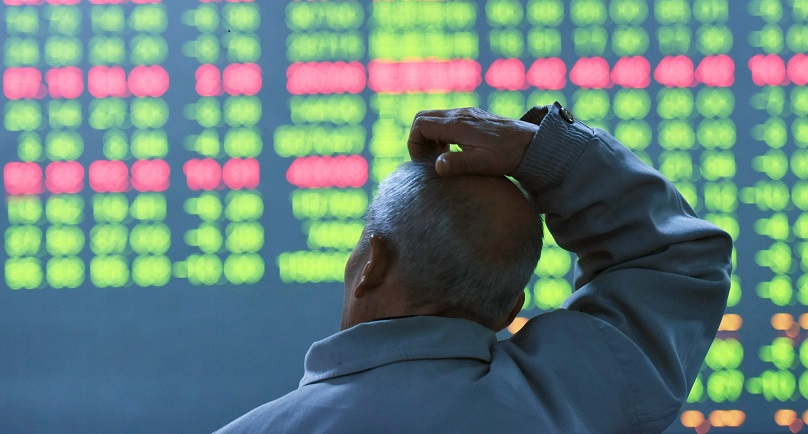Image: An investor looks at an electronic screen showing stock information at brokerage house in Hangzhou, Zhejiang Province, China, January 11, 2016. REUTERS/China Daily
By Pete Sweeney and Lu Jianxin
SHANGHAI (Reuters) – China stepped up efforts to curb bets against its currency and reassure skeptical investors, as its central bank set another firm fix for the yuan on Tuesday backed by what dealers said was aggressive yuan buying offshore.
Ebbing confidence in China’s policymaking has fueled investors’ retreat from the slowing economy, and expectations that the currency will fall further has widened the gap between the tightly managed onshore yuan and the Hong Kong-based offshore rate.
The yuan has depreciated more than one percent since the start of the year, having lost 4.7 percent against the dollar last year, and the accelerated slide had raised uncertainty over China’s intentions regarding the exchange rate.
Analysts said offshore buying by state-owned banks, under the direction of the People’s Bank of China (PBOC), dried up yuan liquidity to such an extent that overnight yuan borrowing rates in Hong Kong (HIBOR) hit a record 66.8 percent.
As a consequence the spread between onshore and offshore yuan exchange rates briefly evaporated, having stood at more than 2 percent last week.
“The strength of its (the PBOC’s) actions appears to have reached the ‘nuclear-weapon’ level, and is comparable to that of the steps taken by other central banks when they previously fought against international speculators, such as George Soros,” said a senior dealer at a European bank in Shanghai.
Perceived missteps by the authorities have stoked concerns in global markets that Beijing might be losing its grip on economic policy, just as the country looks set to post its slowest growth in 25 years.
China’s equity markets, which tumbled 10 percent last week and a further 5 percent on Monday, remained volatile, swinging from black to red and back again. The Shanghai Composite Index rose 0.2 percent and the CSI300 index closed 0.7 percent higher.
China’s central bank manages the currency by setting a daily target for the yuan, which is allowed to trade within a 2-percentage point band either side.
The PBOC set the mid-point for the yuan at 6.5628 per dollar, just two pips weaker than the previous strong fix and firmer than its spot levels late on Monday.
The spot yuan weakened from its overnight close to 6.5733 to the dollar, but offshore it’strengthened as much as 180 pips to 6.5660, reversing a spread that had threatened last week to become unmanageable.
SHARPENING DILEMMA
China’s economy is likely grew by around 7 percent in 2015 and added 13 million new jobs, the top economic planning agency said on Tuesday, as it announced the approval of more large infrastructure projects to avert the risk of a deeper slowdown.
Li Pumin, spokesman for the National Reform and Development Commission (NDRC) told a news conference China’s economy would be in good shape in 2016, though there were still uncertainties.
“We will face a relatively complex and severe environment and there will be increasing difficulties,” said Li, without elaborating.
Fitch Ratings said the government was grappling with a “sharpening dilemma between a perceived need to keep interest rates low to help the economy manage its debt burden, and downward pressure on the Chinese yuan and foreign reserves”.
Sources suggested there were moves afoot for China’s cabinet to take a bigger role in overseeing financial markets.
The State Council has set up a working group to prepare for upgrading the cabinet’s financial department to bureau level, said a source close to the country’s leadership.
Officials were doing their best to talk up the currency.
The PBOC plans to keep the yuan basically stable against a basket of currencies, and fluctuations against the U.S. dollar will increase, Ma Jun, the central bank’s chief economist, said on Monday.
Han Jun, deputy director of the office of the Chinese Communist Party’s Leading Group on Financial and Economic Affairs, said a more substantial decline in the yuan was “ridiculous” and “impossible”.
He was speaking at a briefing held at the Chinese consulate in New York, suggesting the authorities were broadening their verbal campaign to deter yuan sellers.
Not all are convinced, however. Goldman Sachs on Monday sharply cut its forecast for the yuan for this year and next.
“With export growth deeply in negative territory, and exports likely to remain weak in coming months, it is likely easier to reach a policy consensus to allow some depreciation,” Goldman analysts wrote in a note.
Figures for China’s December trade accounts are due on Wednesday and are expected to show further falls in both exports and imports.
(Writing by Wayne Cole, Will Waterman and Alex Richardson; Editing by Neil Fullick and Simon Cameron-Moore)
Copyright 2015 Thomson Reuters. Click for Restrictions.


